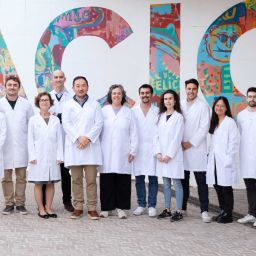
- Recently published in Clinical Cancer Research*, a journal of the American Association for Cancer Research (AACR), VHIO investigators have established a unique collection of metastatic cholangiocarcinoma (CCA) patient-derived xenografts (PDX) to help prioritize potential clinical trials and ultimately deliver precision patient care.
- These preclinical models faithfully recapitulate the molecular and histopathological characteristics of the original CCA patient samples and represent a valuable tool in oncology for evaluating new treatments and identifying novel biomarkers of response. This VHIO-developed library of unresectable advanced CCA models is one of the largest collections in Europe.
- Using these PDXs, the researchers evaluated PARP inhibitor (PARPi) treatment in tumors harboring different mutations linked to homologous recombination deficiency. Results show that sensitivity to PARPi is only observed in tumors with a mutation in the BRCA2
- These preclinical insights suggest that patients carrying a BRCA2 mutation may benefit from PARPi therapy, and that those with other mutations should be prioritized for alternative therapeutic options.
Cholangiocarcinomas (CCAs) are a highly aggressive and diverse group of malignancies of the biliary tract that currently account for 15% of all liver cancers and approximately 3% of gastrointestinal tumors. While rare, the incidence of CAA is on the rise globally.
Often asymptomatic at early stages, CCA is usually diagnosed at advanced stage with a dismal prognosis and limited therapeutic options. The 5-year survival rate of patients with advanced metastatic disease is only 2%. There is therefore an urgent need to develop more effective therapies to improve clinical outcomes in this patient population.
To help respond to this unmet clinical need, investigators at the Vall d’Hebron Institute of Oncology (VHIO) have established a large collection of patient-derived xenografts (PDX) focused on unresectable advanced CCA to preclinically evaluate and identify new treatment options for these patients who are in dire need of more effective treatment options.
Using these preclinical models, the researchers have discovered that mutations of the BRCA2 gene could serve as a robust biomarker of response to treatment with PARP inhibitors, results of which recently published as a Research Article* in Clinical Cancer Research, a journal of the American Association for Cancer Research (AACR).
“This study has enabled us to characterize patient-derived xenograft models of cholangiocarcinoma to help prioritize candidates for targeted therapy with PARP inhibitors as well as achieve a deeper understanding of the heterogeneity of these tumors,” says Queralt Serra-Camprubí, first author of this present paper and a PhD Student (“la Caixa” INPhINIT Fellow) of VHIO’s Noncolorectal Gastrointestinal Cancer Translational Research Group directed by Teresa Macarulla, alongside Tian Tian, leader of preclinical research of the same group.
“Our group combines preclinical and clinical research to translate lab-based cancer discovery into potential new treatments for patients. The tight connectivity and interaction between our basic, translational, and clinical researchers enables us to transform findings at the bench into clinical benefits for patients as rapidly as possible,” explains Teresa Macarulla, a senior author of this study, Principal Investigator of VHIO’s Gastrointestinal and Endocrine Tumors Group, and a Medical Oncologist at the Vall d’Hebron University Hospital’s (HUVH) Medical Oncology Department headed by VHIO’s Director Josep Tabernero.
VHIO’s PDX models of unresectable advanced CCA: one of the largest collections in Europe
PDXs are generated by transplanting intact and surgically-derived tumor samples from patients into mice. By retaining the characteristics of tumors from distinct patients, faithfully recapitulating intra- and inter-tumor heterogeneity, and exhibiting treatment responses concordant with those observed in cancer patients, these models serve as a valuable tool for testing new treatments and identifying novel biomarkers. “Up until now only a few collections of PDX models of cholangiocarcinoma have been reported, the majority of which have been derived from surgically resected primary tumors. This project has enabled us to establish PDX models focused on unresectable advanced disease that mimic cancer patient tumors as faithfully as possible,” says Macarulla.
“Given that these PDX models exhibit treatment responses that are consistent with those observed in patients, they allow us to assess potential new treatments as well as identify novel biomarkers of response to ultimately help guide treatment decision making in the clinic,” adds Tian Tian, a co-senior author of this study.
Analysis of multiple pathogenic mutations
Results of previous studies have revealed multiple pathogenic mutations in CCA. Mutations in the IDH1/2, ARID1A/B, BAP1, and BRCA1/2 genes are detected in between 30-50% of patients with CCA and are therefore becoming promising targets for developing new therapeutic strategies. Preclinical models in different tumor types harboring these mutations have shown enhanced responses to treatment with PARPi due to a deficiency in the homologous recombination repair pathway. Up until now, it has remained unclear whether PARPi treatment could also be an effective targeted therapy for advanced CCAs harboring these mutations.
“Using models derived from biopsy samples of unresectable metastatic cholangiocarcinoma patients with a BRCA2 mutation, representing around 3% of all CCA cases, we now show that these patients respond to treatment with PARPi. Strikingly, models derived from patients with other studied mutations did not respond to this therapy, and the lack of efficacy is in contrast with what would be expected based on previously published data,” says Tian Tian.
He continues, “Our preclinical data therefore suggest that patients harboring a BRCA2 mutation may benefit from PARPi therapy and that those who carry other mutations should be prioritized for alternative therapeutic options.”
Results also suggest that the other non-BRCA2 mutations studied should not be used as pan-cancerous predictive biomarkers of response to PARPi, although their utility in some other tumor types including ovarian or mesothelioma cancer has been previously evidenced.
“It is highly unlikely that patients with advanced cholangiocarcinoma patients would benefit from PARPi monotherapy. Additional studies are required to investigate in which cancer type and/or subtype these mutations are associated with response to these inhibitors,” concludes Teresa Macarulla.
This research has been possible thanks to Sandra Peiró, formerly Principal Investigator of VHIO’s Chromatin Dynamics in Cancer Group, who led the initial phases of this project’s preclinical work, and the Fundación FERO (FERO Foundation), ”la Caixa” Foundation, and Fundació Privada CELLEX (CELLEX Private Foundation), that provide research facilities and equipment. It has also been supported by grants received from the Fundació La Marató de TV3 (TV3 Marathon Foundation), BeiGene, Asociación Española Contra el Cáncer – AECC (Spanish Association against Cancer), and Ramón y Cajal and Instituto de Salud Carlos III (Carlos III Health Institute) research programs.
###
Reference:
* Serra-Camprubí Q, Verdaguer H, Oliveros W, Lupión-Garcia N, Llop-Guevara A, Molina C, Vila-Casadesús M, Turpin A, Neuzillet C, Frigola J, Querol J, Yáñez-Bartolomé M, Castet F, Fabregat-Franco C, Escudero-Iriarte C, Escorihuela M, Arenas EJ, Bernado-Morales C, Haro N, Giles FJ, Pozo OJ, Miquel JM, Nuciforo PG, Vivancos A, Melé M, Serra V, Arribas J, Tabernero J, Peiró S, Macarulla T, Tian TV. Human metastatic cholangiocarcinoma patient-derived xenografts and tumoroids for preclinical drug evaluation. Clin Cancer Res. 2022 Nov 14:CCR-22-2551. doi: 10.1158/1078-0432.CCR-22-2551. Epub ahead of print. PMID: 36374558.
























